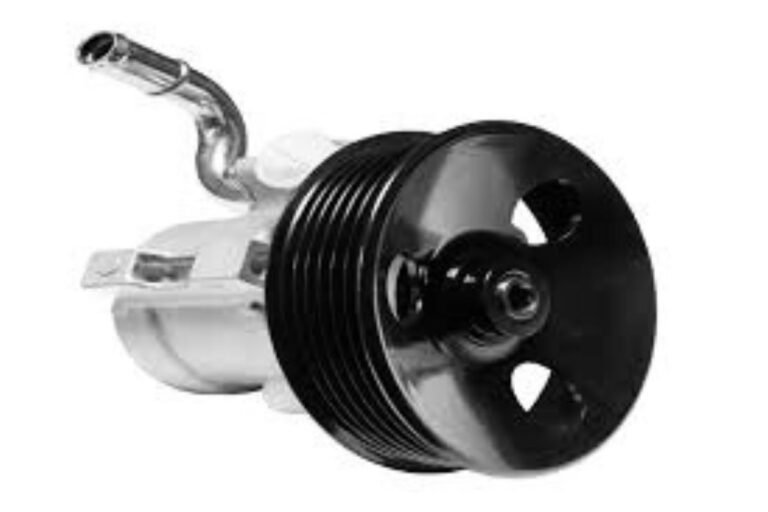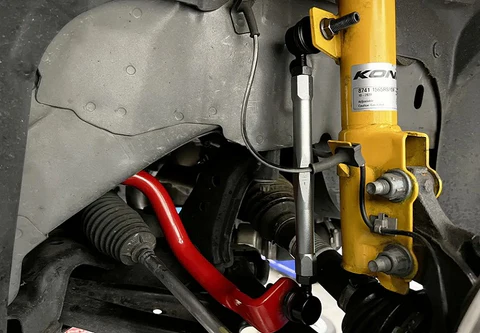Can You Use Transmission Fluid in Power Steering? Know Risks!
Yes, you can use transmission fluid in power steering, but it is not recommended. Using the wrong fluid can damage the power steering system.
It is crucial to use the manufacturer-recommended fluid for optimal performance and longevity of your vehicle’s power steering system. When it comes to maintaining your vehicle, using the correct fluids is essential for proper function and longevity. One area where this is crucial is the power steering system.
While transmission fluid may seem like a suitable alternative, it can lead to issues and costly repairs down the line. In this blog post, we will explore the reasons why using transmission fluid in power steering is not advisable and provide guidance on how to ensure your vehicle’s power steering system remains in top condition.
Transmission Fluid Vs. Power Steering Fluid

Transmission fluid and power steering fluid are both vital components in a vehicle’s operation, but can you interchange them? Let’s explore the key differences in their chemical composition.
Key Differences
Transmission fluid and power steering fluid serve different purposes in a vehicle. The former is designed to lubricate and cool the transmission system, while the latter facilitates smooth steering and helps maintain hydraulic pressure.
Chemical Composition
Transmission fluid typically contains friction modifiers and anti-wear additives, which are crucial for protecting the transmission components. On the other hand, power steering fluid is formulated with anti-foaming agents and seal conditioners to ensure proper hydraulic function and prevent leaks.
The Role Of Fluids In Power Steering
Hydraulic Power Transfer
Power steering systems rely on hydraulic power transfer to assist the driver in turning the steering wheel. This process involves the use of hydraulic fluid to transmit power from the steering wheel to the steering mechanism.
Maintaining System Pressure
Fluids in power steering play a vital role in maintaining system pressure, which is essential for the proper functioning of the power steering system. The hydraulic fluid helps to build and sustain the necessary pressure to facilitate smooth and responsive steering control.
Potential Risks Of Using Transmission Fluid
While it may be tempting to use transmission fluid in your power steering system, doing so can lead to potential risks and long-term damage. It is important to understand the compatibility issues and potential harm that can come from using the wrong type of fluid.
Compatibility Issues
Using transmission fluid in your power steering system can cause compatibility issues due to the differences in the two fluids. Transmission fluid is designed to work with a specific set of materials and components in a transmission system, while power steering fluid is formulated to work with the unique properties of a power steering system.
The differences in viscosity, additive package, and chemical composition can cause damage to the seals and other components in your power steering system over time.
Long-term Damage
Using transmission fluid in your power steering system can lead to long-term damage that can be costly to repair. The transmission fluid can cause the seals in your power steering system to degrade, which can lead to leaks and other issues.
This can cause damage to the power steering pump, which can be expensive to replace. In addition, the transmission fluid can cause excessive wear on the gears, bearings, and other components in your power steering system, which can lead to premature failure.
Overall, it is important to use the recommended fluid for your power steering system to ensure proper function and prevent potential damage. If you are unsure of the correct fluid to use, consult your vehicle’s owner manual or a certified mechanic to avoid the potential risks of using the wrong type of fluid.
Expert Opinions On Fluid Substitution
Experts advise against using transmission fluid in power steering as it lacks necessary additives. This substitution can lead to system damage and compromised performance, risking safety on the road. Always use the recommended fluid for optimal functioning and longevity of your power steering system.
Automotive Technician Insights
When it comes to the question of using transmission fluid in power steering, automotive technicians have varying opinions. Some technicians believe that using transmission fluid as a substitute for power steering fluid can be done in certain situations, while others strongly advise against it.
Technicians who support the use of transmission fluid argue that it can provide similar lubrication properties to power steering fluid. They suggest that in emergency situations where power steering fluid is not available, using transmission fluid as a temporary substitute could be a viable option.
However, it is important to note that this should only be done as a last resort and the power steering system should be flushed and refilled with the appropriate fluid as soon as possible.
Manufacturer Recommendations
On the other hand, most manufacturers strongly recommend against using transmission fluid in power steering systems. They design power steering fluids specifically for the unique requirements of power steering systems. Power steering fluids have additives and properties that help protect seals, prevent foaming, and ensure smooth operation of the power steering pump.
Using transmission fluid instead of power steering fluid can potentially cause damage to the power steering system. It may lead to seal degradation, increased wear and tear on components, and reduced overall performance. Manufacturers emphasize the importance of using the correct fluid recommended for the specific vehicle make and model.
In conclusion, while some automotive technicians may suggest using transmission fluid as a temporary substitute for power steering fluid in certain situations, it is crucial to follow the manufacturer’s recommendations. Using the wrong fluid can have detrimental effects on the power steering system, leading to costly repairs and potential safety hazards.
It is always best to consult the vehicle’s owner manual or seek advice from a trusted automotive professional before making any fluid substitutions.
Real-world Scenarios Of Fluid Replacement
Transmission fluid should not be used in power steering due to different properties, potentially causing damage. Using the correct fluid ensures optimal performance and prevents costly repairs. Always refer to the manufacturer’s recommendations for fluid replacement in real-world scenarios.
Emergency Situations
In certain emergency situations, using transmission fluid in power steering may be necessary as a temporary fix. For example, if you’re in the middle of a road trip and your power steering fluid runs out or becomes contaminated, you may have limited options. In such cases, transmission fluid can be used to ensure you can continue driving until you reach a service station.
However, it’s important to note that using transmission fluid in power steering is only a temporary solution. It should not be seen as a long-term fix, as it can lead to potential complications and damage to the power steering system.
Consequences Of Improper Use
Using transmission fluid in power steering may have several consequences that can negatively impact the performance and longevity of your power steering system. The properties of transmission fluid are different from those of power steering fluid, which means they may not provide the same level of lubrication and protection required by the power steering system.
Here are some potential consequences of using transmission fluid in power steering:
1. Increased wear and tear: Transmission fluid may not provide adequate lubrication, leading to increased friction and wear on the power steering components. This can result in premature failure of the power steering pump, rack, or other parts of the system.
2. Impaired steering performance: Power steering fluid is specifically designed to meet the requirements of the power steering system, providing smooth and responsive steering. Using transmission fluid can affect the system’s ability to operate optimally, resulting in stiff or unresponsive steering.
3. Leaks and damage: Transmission fluid may have different chemical properties than power steering fluid, which can lead to seal damage or leaks within the power steering system. Over time, this can cause fluid loss and further deterioration of steering performance.
4. Costly repairs: Improper use of transmission fluid in power steering can lead to significant damage to the system. Repairs or replacements may be necessary, resulting in added expenses.
To avoid these consequences, it is always recommended to use the appropriate fluid as specified by the vehicle manufacturer. Regular maintenance and timely fluid replacement with the correct type of power steering fluid can help ensure the proper functioning and longevity of your power steering system.
Understanding Power Steering System Components
Pump And Rack Mechanism
The power steering system’s pump and rack mechanism work together to assist in steering the vehicle. The pump generates hydraulic pressure, while the rack mechanism translates this pressure into steering force.
Preventive Measures For Power Steering Maintenance
Ensure proper power steering maintenance by using the recommended fluid type, as transmission fluid may cause damage. Stick to the manufacturer’s guidelines to avoid potential issues and keep your power steering system in top condition. Regularly check the fluid level and quality to prevent any potential problems.
Regular Checks
Inspect power steering fluid level and condition every month.
Fluid Top-up And Replacement
Top up with manufacturer-recommended fluid if levels are low.
Navigating Power Steering Repairs
When it comes to power steering repairs, it’s crucial to understand the components involved.
Identifying Issues
Leaks, strange noises, or stiff steering can indicate power steering problems.
Check the power steering fluid for proper levels and quality regularly.
- Look for any signs of contamination or dark color in the fluid.
- Inspect the hoses and connections for leaks or damages.
Seeking Professional Help
If issues persist, consult a professional mechanic for a thorough inspection.
- Expertise in power steering systems is crucial for accurate diagnosis.
- Technician can recommend the right fluid and repairs if needed.
Avoid using transmission fluid in power steering systems to prevent damage.
Conclusion
After analyzing the different aspects of using transmission fluid in power steering, it is clear that it is not a recommended practice. Although it may work temporarily, it can lead to long-term damage to the power steering system. It is always best to use the manufacturer-recommended fluid for your power steering.
This ensures the optimal functioning of the system and prolongs its lifespan. Taking care of your vehicle’s power steering will save you from costly repairs and ensure a smooth driving experience.

Specializes on car underchassis & power steering repair. We have experienced mechanic to attend all your underchassis & power steering repair needs.




